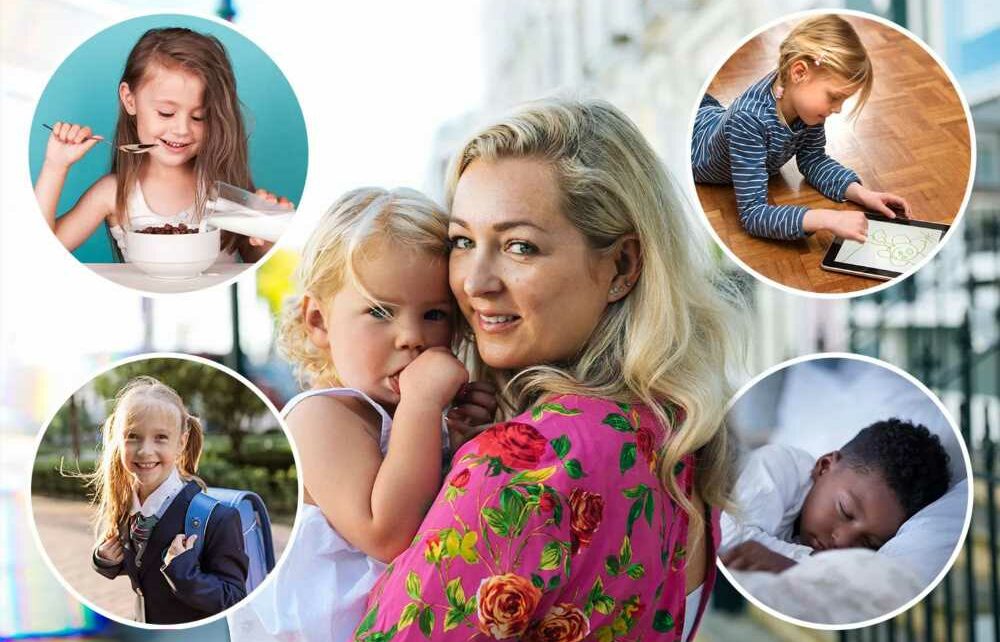MANY children have already started the new school year, but excitement mixed with nerves can result in some children not sleeping well.
Fabulous spoke exclusively to Sleep Consultant Rosey Davidson who shared tips on how to get your little ones back into a routine.

Rosey says: “Start as you mean to go on, gradually adjust bedtime and wake times.
"These need to suit the individual child, but many children get into the habit of going to be later during the school holidays – partly due to the weather, but also our routines are different, and good habits may have slipped.”
“It is important to try to move their internal body clocks gradually, as if you suddenly try to put them to be an hour earlier for example, you will likely be met with resistance – and quite possibly a child who is not yet ready to sleep. This can then result in them being more tired the next day, and unable to concentrate.”
“Move their bedtime by 5-10 mins per day, across a week or so if you can. If they are already back at school, you can begin gradually making bedtime earlier, to help them with the early starts of school.”
Read more on parenting

I’m mum-shamed for having a kid at 45, trolls say she’ll be young when I die

New mum shares the best time of the year to get pregnant & you still enjoy Xmas
Practice makes perfect
The sleep consultant says: “If you are able to get out early in the mornings in advance of starting school as a practice run, this is helpful. It feels less painful when they have to get up to start back at school for real! If you have a child who is starting school for the first time you may find that they have a staggered start.”
“Take advantage of this time and stay on track with your routine. You can even practise the commute to school! This will help with working out your timings going forward. Try to also stick with regular wake and sleep times at the weekend, even if it feels tricky. The consistency in this helps our bodies know when to feel tired, and when to wake up and be alert and ready for learning.”
Each child has individual sleep needs, but the average needs are:
Most read in Fabulous
 DRUGGED IN LOVE
DRUGGED IN LOVE
My husband was jailed for drugging me – then I saw him in my garden
 MYSTIC MEG
MYSTIC MEG
As Venus turns passion-positive, mates can make dream dates
 BILLS & KATE
BILLS & KATE
Kate beams as she watches England’s rugby World Cup opener with Bill Beaumont
 MOTHERHOOD STRUGGLES
MOTHERHOOD STRUGGLES
I’m that mum crying at the school gates, reveals Christine Lampard
- 3-5 year olds: 10-13 hours (including naps)
- 6-12 year olds: 9-12 hours
- 13-18 year olds: 8-10 hours
FABULOUS FIVER: SPEND £5 AND GET A £25 WELCOME BONUS
Reduce screen time

Rosey warns: “Electronic devices emit blue light, which can disrupt our sleep. It is best for your child (and you!) to avoid them for at least an hour before bedtime. If you have an older child who has their own phone, it can be useful for this to be kept out of their bedroom during the night – either in a box or charging in another room.”
“Messages and notifications, or games and chatting online are a huge barrier to sleep. For younger children also avoid tablets and TV before bed wherever possible.”
Look at their diet

Rosey said: “Over the holidays many families find that convenience food and sugar has crept in quite a bit. These things don't help with our sleep. As a starting point think about limiting sugar or stimulants in the afternoon/evenings – this includes sugar and caffeine. Be wary of soft drinks that may contain caffeine.”
Exercise and sunlight
The sleep pro says: “Getting outside and keeping active are the most effective things we can do to help our bodies sleep well. Our circadian rhythm (our internal body clock) is heavily influenced by daylight. Try to spend time outdoors wherever possible, even grey cloudy days are beneficial. Moving our bodies is also important, so that we feel physically tired. Young people especially, need to move a lot across the day!”
Sibling routines

Rosey says: “If you have more than one child, try to create their own individual routines but keep them consistent. It might be that you stagger bedtime according to their sleep needs, or perhaps the younger child goes to bed and the older reads or does a quiet activity in the front room, or their bedroom.”
“We should also role model good sleep habits ourselves – showing our children how we prioritise our own rest, turn off our screens, and get to bed on time is really helpful. Having a discussion about the benefits of sleep can also have a positive effect – how sleep helps us grow, feel happy, and helps fight viruses and bugs away.”
School starters

Here’s what to do if you child is just starting school
Rosey says: “For small children who are starting school for the very first time, be prepared that they might be much more tired than usual. Some little ones are even napping up until they go to school, and in most settings this will no longer be possible.”
“It is okay if they need to nap at the weekend to make up for it, or if they need a short nap when they get in from school. However, be mindful that they don't nap for too long, and do not want to go to bed.”
Tips and tricks
Rosey says uses these tips of you have a particularly stubborn child.
“If you are struggling to wake your child in the mornings, sneak into their room in the morning and open the curtains 20 minutes before they are due to get up. The natural light will help! If it is still light at their bedtime then black out blinds can really help too, or if you have a lot of streetlights outside your home.”
“Be prepared with their uniform laid out the night before, and a healthy breakfast. This will help if you are pushed for time. I like overnight oats, so they are ready to eat immediately, or some good protein to start the day like a boiled or fried egg on toast.”
Family time

Rosey says: “Once everyone is on a new schedule it can feel very busy, with lots of change and new things happening. This often means your child will want to spend time with you to feel grounded. Try to factor in some one to one time, before their bedtime routine so that they can talk to you, play a game with you, or even go for a walk.”
“It is important not to rush through the early evening, even if you are tired yourself. It can mean they stall at bedtime, as they are subconsciously craving that time with you, rather than wanting to go to sleep.”
How to change your routine during school holidays
The sleep pro says: “While flexibility is important, it's always good to maintain our sleep hygiene. This means getting enough sleep at night, and providing the best conditions possible for this. No screens in our rooms, cotton breathable bedding, a room a little on the cooler side (we sleep much better when its colder!), and a good wind down routine before we get into bed.”
Read More on The Sun

Emotional Charlotte Dawson praised for showing off real body after giving birth

M&S fans are scrambling to get a laundry mist that instantly revives clothes
“A warm bath, a bedtime story or guided or independent reading is great. I also highly recommend an amber coloured reading light. These are sleep friendly colours and don't interfere with the process of our body getting ready to go to sleep. We produce a hormone called melatonin (otherwise known as the vampire hormone!) which helps us feel sleepy in the evenings, and we want to work with this, not against it.”
If your child is struggling to adapt, always reach out for help. To either your GP or a sleep professional.
Source: Read Full Article


